Unforgettable Travel Tips for Exploring Portugal: From Timing Your Visit to Choosing Accommodations, Discover Essential Insights for an Extraordinary Adventure
Portugal, nestled along the stunning Iberian Peninsula, beckons with its rich history, vibrant culture, and picturesque landscapes. As you embark on your journey to this enchanting destination, discover essential tips and insights to ensure an unforgettable travel experience.
- Planning for Your Portuguese Sojourn
- Packing Tips
- Language and Communication
- Accommodation
- Getting Around
- Money Matters
- Safety and Health
- Popular Tourist Destinations
- Cultural and Historical Attractions
- Outdoor and Recreational Activities
- Food and Dining Experiences
- Local Etiquette and Customs
- Souvenirs and Shopping
- Portugal’s Tips Unveiled: TwoGuysAbroad Interview
Planning for Your Portuguese Sojourn
Careful planning sets the stage for an extraordinary Portuguese adventure. From choosing the best time to visit to preparing your travel documents, this comprehensive guide will equip you with the knowledge needed to make your Portugal trip seamless and memorable.
A. Timing Your Trip Right
Portugal boasts a diverse climate, making the timing of your visit crucial. Research the seasons, festivals, and weather patterns to select the perfect time for your interests, whether it’s sunny beaches in summer or cultural events in spring.
My advice is to go out of the busy, hot season which is summer. Spring – 15°C to 20°C (59°F to 68°F), autumn – 25°C (77°F) and even winter – 10°C to 15°C (50°F to 59°F) the crowds are less. In August you can enjoy wine tasting, as it’s the grape harvest season. Winter gets too chilly to swim.
B. Setting Your Budget Wisely
Establish a realistic budget encompassing accommodation, dining, activities, and unexpected expenses. Understanding Portugal’s cost of living and currency exchange rates will help you plan your finances effectively. Portugal uses the Euro.
Portugal is generally considered to be a more affordable travel destination compared to many other Western European countries.
C. Deciding on Trip Duration
Determine how long you’ll stay in Portugal. Whether it’s a short city break or an extended exploration, align your itinerary with your travel goals and interests.
However, a 7 to 10-day trip is often recommended to experience the diverse beauty, culture, and attractions that Portugal has to offer. This allows time to explore cities, coastal areas, and historical sites at a comfortable pace.
D. Navigating Travel Documents
Ensure your passport is valid and research visa requirements based on your nationality. Make copies of important documents, like your passport and travel insurance, and keep them secure throughout your journey.
If your passport has less than six months of validity remaining, you might encounter issues when trying to enter a country with such a requirement. It’s generally recommended to renew your passport if it has less than six months of validity left before you plan to travel internationally. This helps avoid any complications or denial of entry at your destination.
Packing Tips
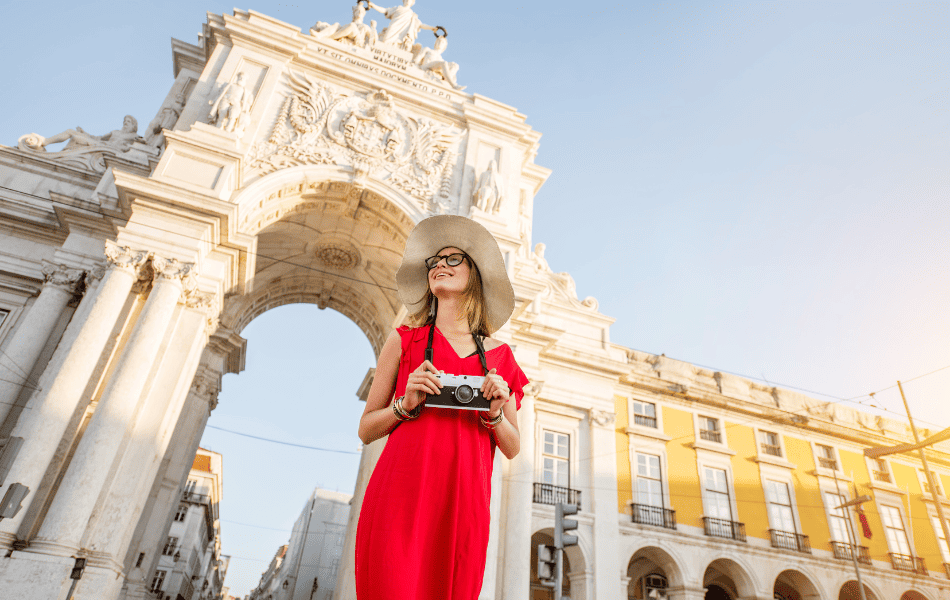
- Weather-Appropriate Attire: Pack clothing suitable for Portugal’s climate, which varies by region and season. Lightweight, breathable fabrics are ideal for summer, while layers are essential for unpredictable weather. Don’t forget comfortable walking shoes for exploring the cobblestone streets.
- Electrical Adapters and Converters: Portugal uses Type F electrical outlets with a voltage of 230V and a frequency of 50Hz. Bring the necessary adapters and voltage converters if your devices require them to avoid any charging or power issues.
- Medications and Travel Insurance: Carry a small medical kit with essentials and any prescribed medications. Secure comprehensive travel insurance to cover unexpected medical expenses, lost baggage, and trip cancellations for peace of mind.
- Pack Light and Smart: Opt for versatile clothing items that can mix and match to maximize your wardrobe while minimizing luggage weight. Rolling your clothes and using packing cubes can help save space and keep your belongings organized.
Language and Communication

While many Portuguese people speak English, learning a few basic Portuguese phrases can enhance your travel experience and show appreciation for the local culture. Familiarize yourself with common expressions to facilitate communication.
Useful Portuguese Phrases for Travelers
- Hello – Olá
- Thank you – Obrigado (for males) / Obrigada (for females)
- Please – Por favor
- Excuse me – Com licença
- Yes – Sim
- No – Não
- How much does this cost? – Quanto custa?
- Where is the restroom? – Onde fica a casa de banho?
- I need help – Preciso de ajuda
- Goodbye – Adeus
English in Portugal
English is widely spoken in tourist areas, especially by younger generations and in larger cities. However, in more rural or remote locations, having some Portuguese language skills can be particularly helpful. Don’t hesitate to use English when needed, but knowing a few phrases can enhance your interactions and experiences.
| Google Translate: Google Translate is a widely used and reliable translation app. It supports translations for over 100 languages, offers text and voice translation, and even has a camera feature for translating text from images. |
| Duolingo: While Duolingo is primarily known as a language-learning app, it also has a feature for translating real-world texts. Users can practice their language skills by translating sentences and paragraphs in the language they are learning. |
| Microsoft Translator: Microsoft Translator is a versatile app that offers text and voice translation for more than 60 languages. It also includes a conversation mode for real-time multilingual conversations and supports offline translation for certain languages. |
These apps can be incredibly useful when traveling or communicating in foreign languages, helping you understand and convey information effectively.
Accommodation
When selecting your accommodation in Portugal, consider a more immersive experience. Instead of traditional hotels, explore charming guesthouses or “quintas” (country estates) in the countryside. These offer not just a place to sleep but a chance to connect with Portuguese culture. Engage in wine tastings on vineyard estates, savor homemade meals with local hosts, or stay in centuries-old cottages. These options provide an authentic and unforgettable Portuguese experience that goes beyond the standard tourist stay, immersing you in the country’s rich heritage and warm hospitality.
| My blog on Transform Travel with Purpose: Make a Positive Impact will most certainly give you a different perspective. Another good read Age-Defying Travel: Wellness Retreats for Seniors Around the World assists you to think outside the norms of travel. |
Types of Accommodation
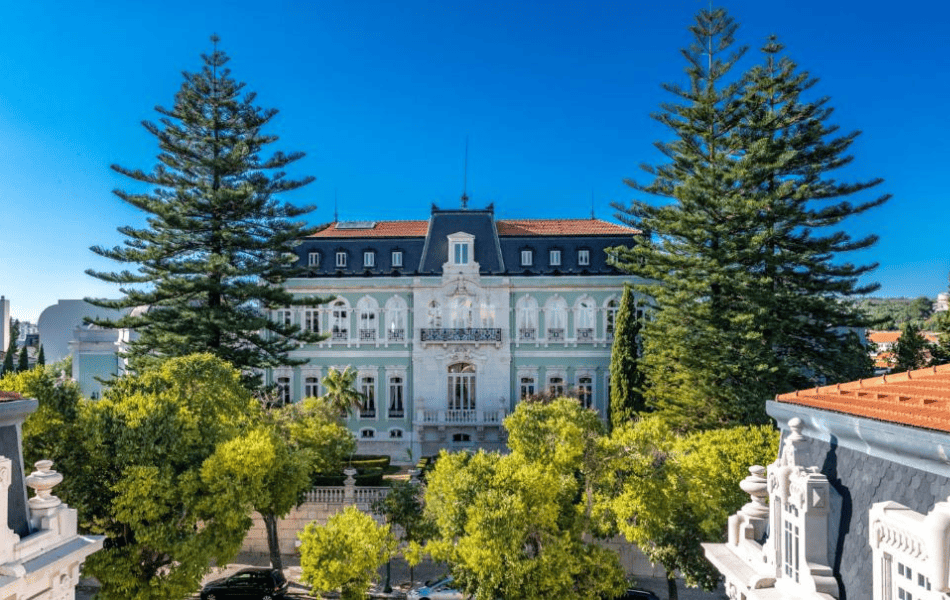
Portugal offers a diverse range of accommodations to suit various preferences and budgets. Here are some types of accommodations along with two recommended places in each category, based on their popularity and positive reviews on TripAdvisor and booking.com.
- Hotels:
- Pestana Palace Lisboa Hotel & National Monument (Lisbon): A luxurious 5-star hotel set in a 19th-century palace with beautiful gardens and stunning views of Lisbon.
- The Yeatman (Porto): A wine-themed 5-star hotel overlooking Porto with an extensive wine cellar and a Michelin-starred restaurant.
- Hostels:
- Goodmorning Solo Traveller Hostel (Lisbon): A vibrant and social hostel located in the heart of Lisbon’s historic district, offering affordable dormitory and private rooms.
- Yes! Lisbon Hostel (Lisbon): A highly-rated hostel known for its friendly atmosphere, clean facilities, and organized tours and activities.
- Airbnb:
- Charming Alfama Studio (Lisbon): A cozy and stylish apartment in Lisbon’s historic Alfama district, offering a glimpse into local life.
- Rooftop Oasis in Porto’s Historic Center (Porto): A unique Airbnb with a private rooftop terrace and fantastic views of Porto’s old town.
- Guesthouses:
- Casa do Plátano (Sintra): A charming guesthouse in the picturesque town of Sintra, offering comfortable rooms and a serene garden.
- Alma Moura Residences (Lisbon): A boutique guesthouse with a blend of modern design and historic architecture in Lisbon’s city center.
- Quintas (Country Estates):
- Quinta da Pacheca (Douro Valley): A beautiful wine estate in the Douro Valley, offering vineyard tours, wine tastings, and cozy accommodations.
- Quinta Jardins do Lago (Funchal, Madeira): A historic quinta in Madeira with lush gardens, a pool, and a tranquil atmosphere.
Remember to check the most recent reviews and availability on TripAdvisor, booking.com or other booking platforms before making your reservation, as the popularity and quality of accommodations can change over time.
Booking in Advance vs. Last-Minute Options
While booking in advance ensures peace of mind and availability, spontaneous travelers might find last-minute deals appealing. Advance bookings secure your preferred accommodation and often offer discounts. Conversely, last-minute options can lead to cost savings but come with limited choices. The choice depends on your travel style, flexibility, and willingness to take a chance on availability and pricing.
Getting Around
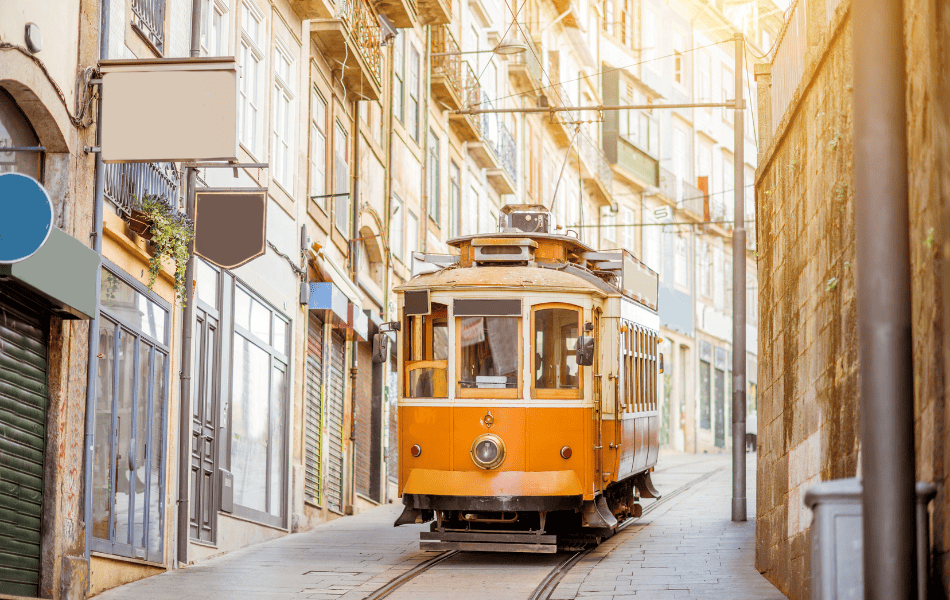
Transportation Options
The country offers an array of transportation options, from efficient trains and buses connecting cities to rental cars for exploring off-the-beaten-path destinations. Choose the mode that suits your itinerary and preferences.
Navigating Public Transportation
Portugal’s major cities have well-developed public transportation networks, including trams, metro systems, and buses. Familiarize yourself with routes, schedules, and ticketing options for convenient urban exploration.
The ‘Flix Bus’ system exemplifies the efficiency and reliability of the country’s transit. Operating across cities and picturesque regions, these buses offer a comfortable and cost-effective means of travel. With well-planned routes and schedules, Flix Buses connect tourists to both popular destinations and hidden gems, ensuring a seamless and enjoyable journey through the diverse landscapes and rich cultural tapestry of Portugal. Definitely the way to travel around the country!
| Comboios de Portugal (CP): This is the official app for Portugal’s national railway company, CP. It provides schedules, ticket booking, and real-time information on train services across the country. |
| Flix Bus app: This is an app you must download. Both for Flix Bus and Flix train. Very affordable! |
| Moovit: Moovit is a comprehensive public transportation app that covers buses, trams, and other forms of transit in many cities around the world, including Portugal. It offers real-time tracking, route planning, and service alerts. |
| Google Maps: Google Maps is a widely used navigation app that also includes public transportation information for many cities, including those in Portugal. You can use it to plan routes and get real-time public transportation updates. |
Driving in Portugal
If you opt for a rental car, be aware of Portugal’s traffic rules, road signs, and toll systems. Most highways are well-maintained but prepare for narrow roads in rural areas.
In Portugal, as in many other European countries, people drive on the right-hand side of the road. The steering wheel is on the left side of the vehicle, and traffic moves on the right side of the road.
Money Matters
- Currency and Payment Methods: Portugal uses the Euro (EUR, €) as its official currency. Credit and debit cards are widely accepted, especially in urban areas. However, it’s advisable to carry some cash for smaller establishments and markets.
- Currency Exchange and ATMs: Currency exchange services are available at airports, banks, and exchange offices. ATMs are prevalent and offer a convenient way to withdraw Euros. Check with your bank about international withdrawal fees before your trip.
- Budgeting for Your Trip: Establish a daily budget that covers accommodation, food, transportation, and activities. Portugal is known for its affordability, but your budget should align with your travel style and desired experiences.
Safety and Health

Portugal is generally safe for travelers, with low crime rates. Exercise common-sense precautions like safeguarding belongings and avoiding poorly lit areas at night to ensure a trouble-free trip. The common pickpocket can be found in high tourist areas.
“According to Numbeo statistics, the northern city of Porto is the most dangerous city in Portugal.Despite being Portugal’s most dangerous city, tourists still have a very low risk of facing violent crime or muggings in Porto.”
– Esther Marshall, Express UK, august 2022
| In case of emergencies, dial 112 for general assistance. For specific emergencies: Medical: 112 Police: 112 Fire: 112 |
Knowing your country’s embassy number and storing it on your phone is also advised.
Health Precautions and Vaccinations
Portugal typically requires no specific vaccinations for entry. Travelers should carry any necessary medications and health insurance. Tap water is safe to drink in most areas, but bottled water is readily available for those with sensitive stomachs.
Popular Tourist Destinations
Lisbon
Lisbon, Portugal’s capital, enchants its historic neighborhoods, like Alfama, and iconic landmarks such as the Belém Tower and São Jorge Castle. Explore its vibrant culture, diverse cuisine, and scenic viewpoints.
Porto
Porto, renowned for its port wine cellars, offers picturesque riverfront views and the historic Ribeira district. Visit the Clerigos Tower and the Livraria Lello, one of the world’s most beautiful bookstores.
Sintra
Sintra is a fairy-tale town dotted with colorful palaces and lush gardens, including the Palácio da Pena and Quinta da Regaleira. It’s a UNESCO World Heritage site and a short train ride from Lisbon.
Faro and the Algarve
The Algarve region boasts golden beaches, rugged cliffs, and charming towns like Faro. Explore the stunning coastline, relax on the beaches, and enjoy water sports.
Douro Valley
The Douro Valley is famous for its terraced vineyards and wine production. Take a river cruise and savor wine tastings at local vineyards while enjoying breathtaking landscapes.
Cultural and Historical Attractions
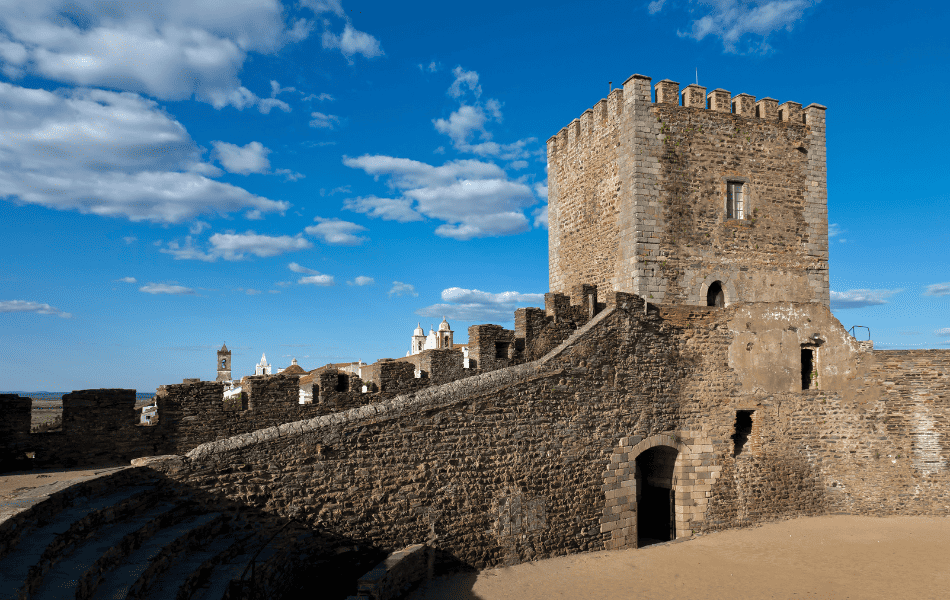
- Belem Tower: This iconic tower in Lisbon is a symbol of Portugal’s Age of Discovery and offers panoramic views from its turrets.
- Jerónimos Monastery: A masterpiece of Manueline architecture, this UNESCO-listed monastery in Belem showcases intricate stone carvings and historical significance.
- Évora’s Historic Center: Explore Évora’s well-preserved Roman and medieval heritage, including the Temple of Diana and the Cathedral of Évora.
- Coimbra University: Visit one of Europe’s oldest universities and explore its historic library, Biblioteca Joanina, known for its Baroque beauty.
- Monsaraz Castle: This medieval castle in the Alentejo region offers a glimpse into Portugal’s past and panoramic views of the surrounding countryside.
Outdoor and Recreational Activities
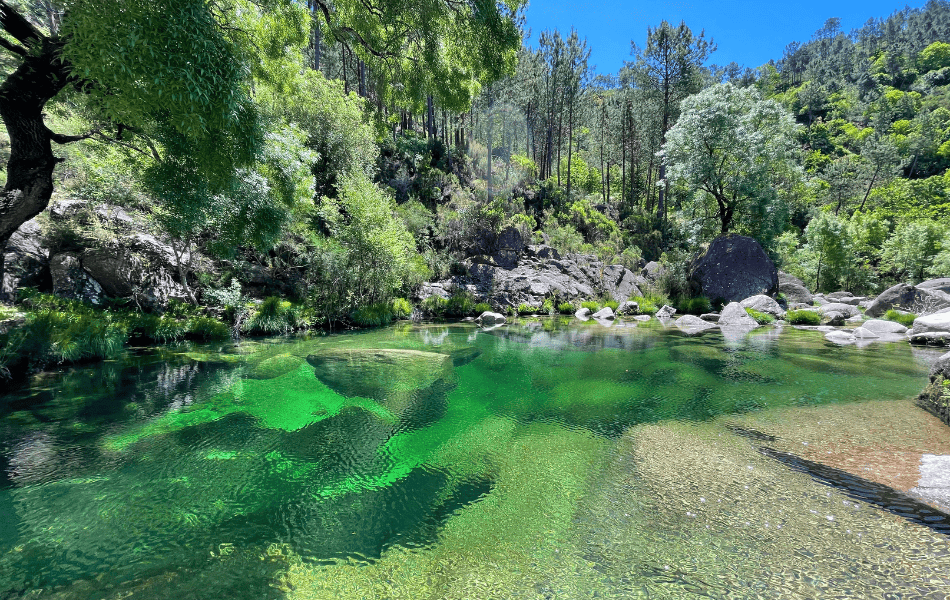
- Surfing in Peniche: Peniche is a surfers’ paradise with great waves and surf schools for all skill levels.
- Hiking in Peneda-Gerês National Park: Explore Portugal’s only national park, known for its stunning landscapes, waterfalls, and hiking trails.
- Kayaking in the Algarve Caves: Discover hidden sea caves and grottoes along the Algarve coast with guided kayak tours.
- Biking in the Douro Valley: Cycle through vineyards and along the Douro River for a scenic and active adventure.
- Bird Watching in Ria Formosa Natural Park: This coastal park is a haven for birdwatchers with diverse avian species and pristine wetlands.
Food and Dining Experiences
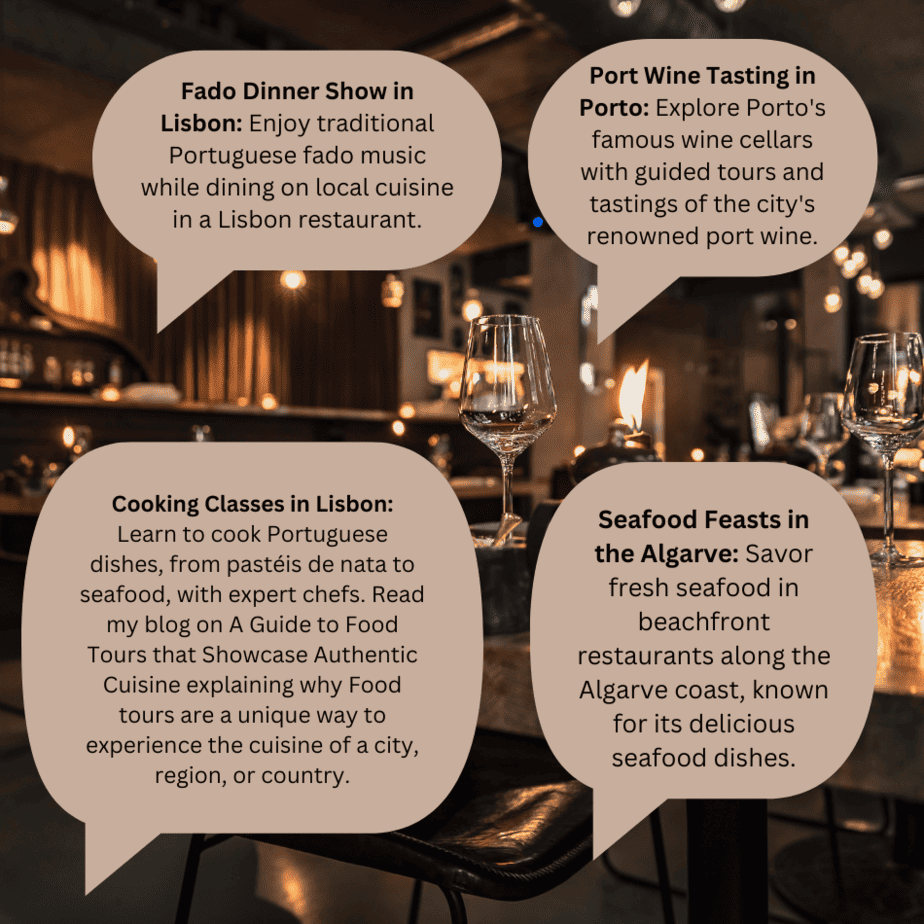
Local Etiquette and Customs
- Respectful Greetings: When meeting locals, a polite greeting is important. Use “Bom dia” (Good morning), “Boa tarde” (Good afternoon), or “Boa noite” (Good evening) as appropriate. Shake hands when introduced and use formal titles unless invited to use first names.
- Punctuality Matters: Punctuality is valued in Portugal. Arrive on time for meetings and appointments, as tardiness is considered impolite. It shows respect for others’ time and schedules.
- Dining Etiquette: When dining, wait for the host or hostess to start the meal. Use utensils properly, and don’t rest your elbows on the table. When finished, place your knife and fork together diagonally on the plate. It’s customary to say “Bom apetite” (Enjoy your meal) before eating.
Souvenirs and Shopping
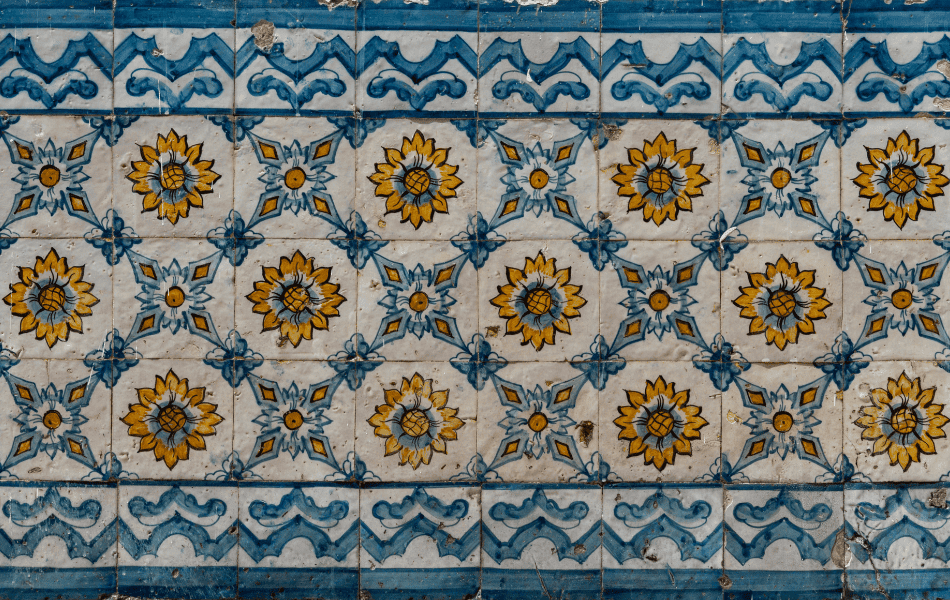
A. Unique Portuguese Souvenirs
Portugal offers a variety of distinctive souvenirs. Look for hand-painted ceramic tiles, known as “azulejos,” cork products, such as bags and accessories, traditional Portuguese pottery, and gourmet items like Portuguese wines, cheeses, and pastries.
B. Shopping Districts
Explore vibrant shopping districts like Lisbon’s Baixa and Chiado, Porto’s Rua de Santa Catarina, and the historic markets in cities like Sintra and Faro. These areas offer a delightful shopping experience with a wide range of boutiques, shops, and local crafts.
Portugal’s Tips Unveiled: TwoGuysAbroad Interview

Thank you guys for doing the interview with me to assist others who will be venturing to Portugal.
Climb aboard and enjoy the journey that spans over 14 years of global exploration, the dynamic duo behind ‘TwoGuysAbroad,’ Donavan and Mike. They have not only accumulated an impressive collection of travel stories but have recently made Portugal their cherished home. What began as a series of adventures around the world has evolved into an immersive experience in the heart of Portugal. Today, we dive into their rich tapestry of travel wisdom, uncovering invaluable tips and insights from their incredible journey.
| 1. Can you share your favorite hidden gem or less-known destination in Portugal that travelers should explore? Travelers would naturally gravitate to the top “must-do” locations like Porto, Lisbon, and the Algarve, but there are many hidden gems. Some of my favorites include Braga, Barcelos, Sintra, and Obidos. |
| 2. What are some cultural etiquette tips or customs that you’ve learned living in Portugal that tourists should be aware of to have a more immersive experience? Basic manners go a long way. Learn your, “Please”, “Thank You”, “Good day” etc. If the locals see you are trying they will appreciate it and most likely revert to English. The majority do speak English, but you might find the odd person in a small village who can’t. For these instances, Google Translate audio goes a long way. |
| 3. Portugal is known for its delicious cuisine. What are a few must-try dishes or food experiences that travelers shouldn’t miss? Seafood, chicken, and pork are a staple. They love their sardines (only fresh) and dried/salted Cod fish is also popular. The Codfish is soaked and washed for days to get rid of the salt (which is primarily for preserving the fish), once rehydrated dishes like “Bacalhau à Brás” and Cod fish fritters are popular dishes. You will also see the mighty “Francesinha” everywhere. A triple-layered sandwich (similar to a Club Sandwich) layered with cheese and meats, covered in a secret sauce. Each venue has its own sauce recipe so it’s quite contentious throughout Portugal as to who has the best Francesinha’s. |
| 4. Could you recommend some off-the-beaten-path outdoor activities or recreational pursuits that you’ve discovered during your time in Figueira da Foz or elsewhere in Portugal? The Portugues are very health/fitness orientated and you will see them jogging along the beaches, taking forest walks, or canoeing along one of the many rivers that span throughout Portugal. Electric tourist bike stands are also scattered everywhere in most larger towns and villages. |
| 5. How do you navigate the different regions and climates in Portugal, and what’s your advice for travelers on choosing the best time to visit based on their interests. The Algarve in the south is very dry and hot in summer as opposed to the north which is cooler but a little more humid. Inland can also be up to 8 degrees hotter than the coast. In winter the north gets considerably more rain than the south, but let’s face it, Europe in winter is miserable everywhere. August is your busiest/hottest month with school vacations starting early August to mid-September. So the best times to visit Portugal would be in the shoulder months in Spring and Autumn. June, July, and September, and maybe into the first half of October. |
| 6. Are there any unique festivals or cultural events that you’ve participated in or observed in Portugal that travelers should plan their trips around for an unforgettable experience? We enjoyed “Carnival” which takes place in February. It’s very similar to the Brazilian Mardi Gras. Street parades of floats, feathers, and Samba music are arranged in just about every town in Portugal. The São João festival in late June celebrates Saint John the Baptist and is also a huge festival throughout Portugal. |
| 7. In terms of transportation, what tips do you have for getting around Portugal efficiently, whether it’s for day trips or exploring different cities? The train system will connect you to every town in Portugal, it’s also a picturesque journey. One can also use the “Flix Bus” to connect you to major towns, once at your location Uber’s or local taxis are inexpensive and trustworthy. |
| 8. Could you share some budget-friendly travel strategies for tourists looking to make the most of their trip to Portugal without breaking the bank? We use the “Pastel de Nata” (Portuguese custard tart) index. They are most expensive in Lisbon and the further north you go the cheaper it gets. Most restaurants also offer a 3-course lunch special, so eat large for lunch (as they do) and a light snack for dinner. |
| 9. Safety is a concern for many travelers. What safety measures or advice do you have for visitors to Portugal, both in terms of personal safety and protecting their belongings? Tourist hot spots in Lisbon and Porto are where you need to be most vigilant. There are always chancers looking for a soft target. Pickpocketing is the most likely occurrence in busy and congested areas. So best to leave travel docs and large sums of cash at your accommodation. Take just what you need for the day, but in general, Portugal is in the top 10 safest destinations in the world making it a good destination for travelers |
| 10. Lastly, what’s the most important lesson or piece of advice you’ve learned from your experiences traveling and living in Portugal that you’d like to pass on to fellow travelers looking to explore this beautiful country? There are many hidden gems throughout Portugal and it would be well advised to explore it from top to toe. When looking for a town to settle down in, we found each town more beautiful than the first. It was a difficult decision, but in the end, we found the right fit. There is no right or wrong travel itinerary because wherever you go will be the most amazing experience. |
I hope you have gathered some valuable tips for your adventure to Portugal. Please LIKE, SUBSCRIBE, and SHARE this article. If you have some unique tips of your own, please feel free to comment, so others can benefit.
2 thoughts on “Essential Tips for an Unforgettable Trip to Portugal”
Comments are closed.
Recent Posts
Discover Peartree Serviced Apartments Salisbury, once the Clovelly Hotel, a pet-friendly, stylish stay near the cathedral, station and Wiltshire’s top sights. Some places simply give you a bed...
Discover insider tips to find cheap flights from the UK, save on easyJet, Ryanair & BA, and score the best weekend and last-minute deals. Why You’re Paying Too Much for Flights Most UK...


Opening new worlds to explore. I love the detail in this post. Thank you.